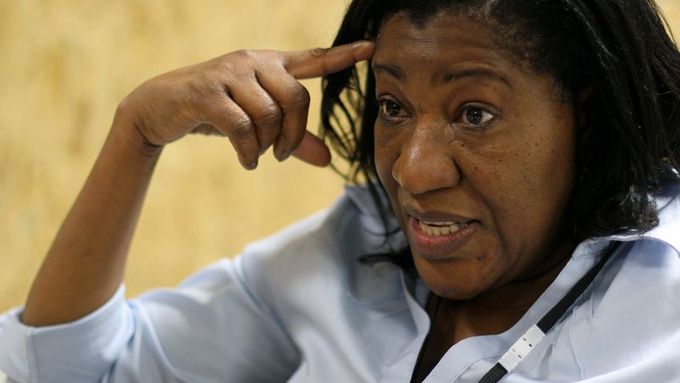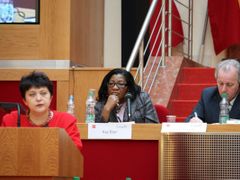Prague - "Your society lacks a strong government that would send out a clear message against racism and discrimination," says Kay Blair, an executive director of a community agency in Toronto, Canada.
Microskills Development Centre provides services to the unemployed, immigrants, low-income women and youth.
Kay Blair visited the Czech Republic during a state visit of Canada's Governor General Michaëlle Jean in the country. She spoke to Aktuálně.cz about the minority group integration.
Blair says that the Czech Republic is "on the right track" in trying to integrate their minority groups and yet, she has plenty of critical points about the Czech Roma integration.
A.cz: You visited the Museum of Roma Culture in Brno, you participated in debates on integration of minority groups in Brno and Prague. What impressions did you get of the Czech Roma integration?
When I got to the Roma museum in Brno, I was amazed by the level of pain that they express there. I cried because what I kept hearing was that there is a group of people who by virtue of the racialization do not have access to the quality of life that a non-racialized person has access here. They talked about the conditions in which they live in the 21st century and about their hopelessness. But I don't understand the political structures here to be able to analyze what it is within the structure that causes that.
You are talking about hopelessness. But Roma people have been living here for a long time. And the situation seems to be the same. Aren´t they to be blamed too?
At the panel [of the Multicultural Dialogue Conference], when we talked about the immigration to the Czech Republic, one of the panelists talked about open racism and discrimination immigrants face here. And the reality is people who have to deal with their basic economic needs are not going to be settled so easily. If you can't provide for their children, they're not going to be adopted on the daily basis. But it is only a reflection of what I saw and heard and it seems to me Czech society is not healthy in this respect. Romany here are not part of the whole and that's not good.
You met a number of Czech politicians. Do you think they get engaged in these issues enough?
I heard the minister [of human rights Džamila Stehlíková] talking about her commitment to do something with the Roma situation. She said that they have a strategy towards that. But it is not only about the money you provide. You can say to the Romany "Here, take a few thousand dollars and stay where you are", but you can still take a few thousand dollars and invest in a new sustainable strategy of integration with no need to invest later in the future.
In other words, what I see here is more of a separation of people. We will give you this and you stay where you are. So it seems like the Romany do not get the opportunity to integrate. But it's only my observation. But I do believe that there are other possibilities to support and integrate people in a better way in this country.
Do you know of any models of minority group integration applied in Canada that could work here?
If you have a minority group that is not afraid to have plenty of kids, invest in their education. There is a great potential in them. I am talking about having programs after school for the kids. If parents are not educated enough, there's got to be external support for their kids with their homework. Support them not to drop out. Our organization works in a very poor neighborhood and we have an office right in a school there.
So where did the Czech Republic go wrong?
Your society lacks a strong government that would send out a clear message against racism and discrimination. That would help to influence the public opinion about the Roma people. Because if there is a leadership from the government that says: Roma people are part of us and we welcome them, they have a right to quality housing, to quality employment, their children have a right to be in schools and they have to be sitting in the same classroom to have the same education as a regular Czech kid -if that kind of leadership is demonstrated by the Czech government and if this message is sent out to the broader community, it reduces social tension and bias attitudes within the community.
But the Czech government is trying to engage Roma community representatives in their policy making but sometimes they get into a row with each other and they cannot reach a consensus. What to do then?
You cannot wait for total unity in a community in order to trigger any kind of change. We don't have 100% unity in Canada either. Leadership from the government makes a big difference. If you invest in the NGO sector, if you work with organizations to set up programs to reach out to communities, if you give them a sense of hope, you will achieve change little by little. Because once people start seeing that they can enjoy some benefits from the programs, their life is changing and they're integrating and their kids are doing well in school, others will start to follow. And that's the key.
In the past few years Canada welcomed dozens of Roma families who left the Czech Republic. Some of the Czech top politicians claim the reason they left were of mainly economic background. But others say the Romany have been fleeig to Canada because of the discrimination they face in this country. One interesting aspect is that they easily find a job in Canada and have no problem keeping it, unlike here. What is your view of this?
There's a small Roma community in the city of Toronto, about 400 people. And there are about a thousand in the city of Hamilton. I don't know if they are there because of economic reasons. The do find an employment in Canada, though. It surely isn't a great job they have but it is employment, so at least they can pay the bills, they live somewhere, the kids go to school and they have access to community programs and services. I don't know if people who feel oppressed do it for the economic reason. They do it because they want to have hope. They want their children to live without a threat of violence. In Canada there's a law against discrimination. I wouldn't say it is perfect and that there is no discrimination in our country but at least you can get your voice heard.
Do Canadians abuse social allowances?
There is a safety net for people when they lose their jobs, so there is a kind of insurance provided to them. But people don't live on social allowances for their entire life. It is aimed mainly to help them to find another job. In my opinion the Roma do not leave your country for the economic reasons but more because they do not feel a sense of belonging here. And if you can get to a country that treats you with dignity and respects you, of course you want to go. Who would not want to? I would.
You do not really spare the Czech Republic. And yet, did you note any positive changes here?
Of course. I think there's an improvement - you have a minister [of human rights] who says that the political leadership is in progress. She has to listen to people more, though. It might be a challenge for her and perhaps it is now. And I think Czechs are open to the principles of democracy. Your president spoke at the dinner about the commitment to democracy and to a civil society. If that kind of leadership is there, than it is good, you're on the right track.


